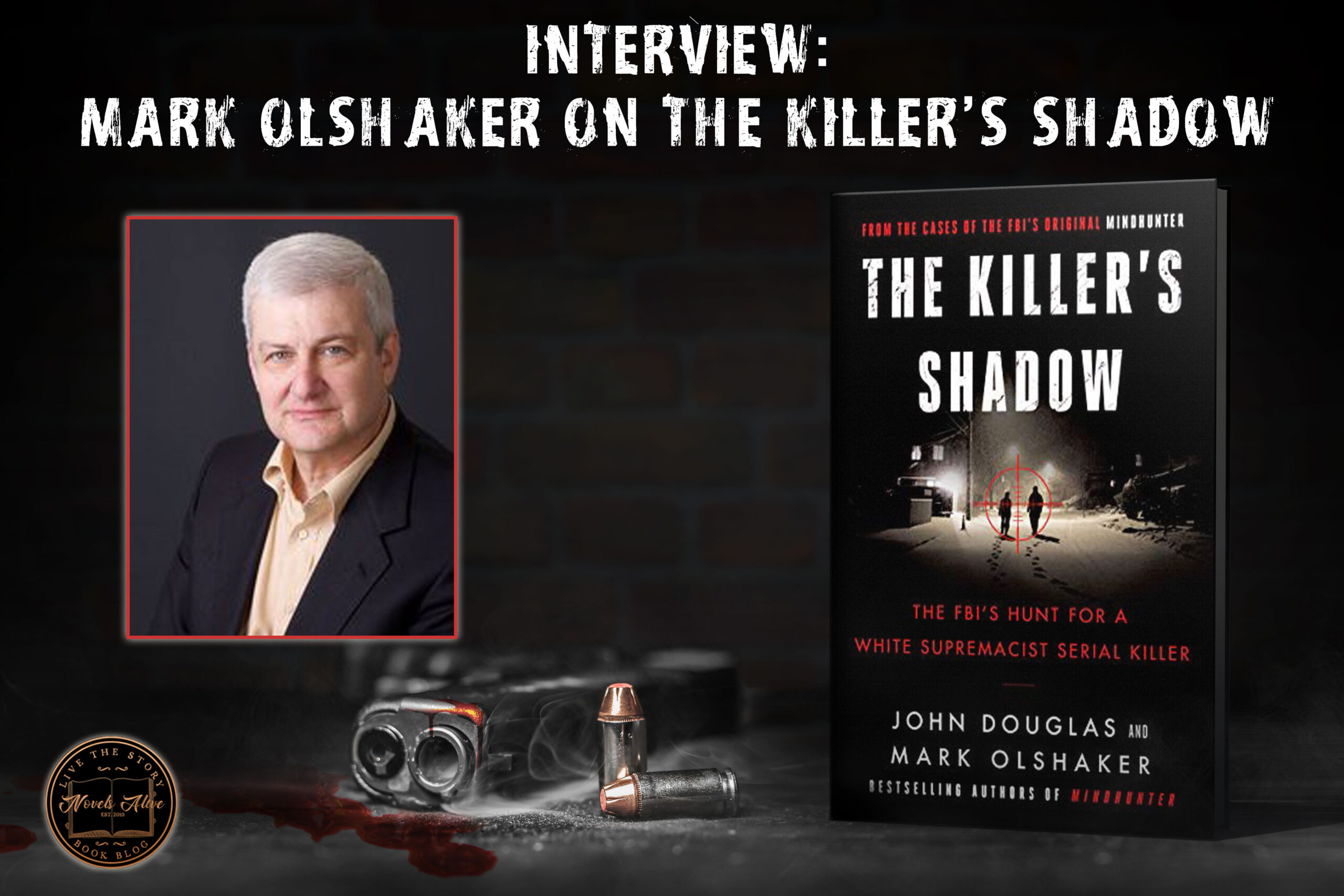 We are thrilled to welcome New York Times, international bestselling author and one-half of the writing team who brings us The Killer’s Shadow: The FBI’s Hunt For a White Supremacist Serial Killer, Mark Olshaker!
We are thrilled to welcome New York Times, international bestselling author and one-half of the writing team who brings us The Killer’s Shadow: The FBI’s Hunt For a White Supremacist Serial Killer, Mark Olshaker!
Our intrepid reviewer and lover of True Crime novels, Katie Steuart, interviews Mr. Olshaker about The Killer’s Shadow and other books he and legendary FBI criminal profiler John E. Douglas have penned together and many other topics. So settle in, grab a cuppa, and get ready for some enlightening answers.
Based on your knowledge of Joseph Paul Franklin, do you feel that he was sincere in the end when he claimed to no longer be racist? Also, do you feel he finally had genuine remorse in the murders he committed?
This is an interesting question. Though he professed to have reformed his thinking toward the end of his life, we saw plenty of examples of Franklin still using the N word, and letters he wrote to John Douglas in the 2000’s certainly reflect his deep-seated hatreds and prejudices. He had been in prison long enough that he might have realized his entire life’s mission was futile, but had he not been caught when he was, there is no doubt in my mind that his mission-oriented killing spree would have continued. In every prison interview he had with law enforcement authorities, including John Douglas, he was completely matter of fact about each murder.
Are there fewer serial killers now than there were in the 1970s or 1980s?
I seriously doubt there are fewer serial killers now than back in the 1970s and 1980s. It’s just that we pretty much know who the serial killers were then, and we probably haven’t discovered them all currently operating. Also, since the 1970s was when the term was first coined, there was probably more focus on them, just as there was for the “classic” criminals the FBI faced in the 1920s and 1930s, like John Dillinger, Machine Gun Kelly, Pretty Boy Floyd, the Barker gang, etc.
Regarding the theory of Nature vs. Nurture you write in this book that it is both, being that it’s a “dynamic action between the two.” Can we assume that there have always been serial killers and always will be?
We have often speculated on whether there have always been serial killers and think that many incidents in ages past that were attributed to witches, wizards, werewolves or other supernatural phenomena were probably the work of serial killers. Having said that, however, we think there are probably more repeat killers around now that we have large, impersonal populations and easier means of transportation. The Nature vs. Nurture question will always be with us, and we have dealt with it in some form in just about all of our books. After all these years of working together, John and I have reached the unmistakable conclusion that just about all human behavior—good and bad—results from dynamic action between the two. As far as whether there always will be serial killers, we view crime the way physicians and scientists view disease—we will never eliminate either but we will constantly strive to diminish both as powerfully as we can.
With less tolerance than ever in our society to racism and hate crimes, does this lessen the chances of the emergence of a “Lone Wolf” killer such as Franklin and/or Ted Kaczynski?
I wish we could say that there is less tolerance than ever to racism and hate crimes. Instead, I think there is simply more awareness of them, and I hope, less tolerance from a greater percentage of the population. I think the current political climate and the words and pandering of the outgoing president have actually encouraged right wing extremists and white supremacists. And one of the things we try to show in The Killer’s Shadow is that it is still extremely difficult to predict who is going to emerge as a lone wolf. Though men like Joseph Paul Franklin and Ted Kaczynski each had his own mission agenda and they were nothing alike, and that Kaczynski was extremely bright while Franklin was sort of dull normal in intelligence, they both suffered from a deep-seated feeling of inadequacy that was constantly warring with an equally powerful sense of grandiosity and entitlement, with both of these sensations triangulated by an anger and resentment that other people and society in general were not giving them their due.
On the other hand, with the current upheaval and division in our country, could this atmosphere encourage a potential group or individual to commit acts of extreme violence?
The FBI is always worried about organized acts of violence, from both the extreme right and the extreme left. Likewise, in the current divided climate, John and I continued to be worried about both lone wolves and a tipping point in which groups turn violent. For example, what would it have taken for the mobs who marched down the streets of Charlottesville, Virginia, in 2017, chanting, “Jews will not replace us!” and “Blood and Soil” (a classic Nazi slogan) to transition into violent action due to some inciting incident or the “right” leader to egg them on? I think this is a perilous time as far as hate and resentment of “the other” is concerned, which is one of the reasons we wanted to write this book.
I liked in particular that you wrote, “The FBI is the Federal Bureau of Investigation, not the Federal Bureau of Prevention.” However, do you have ideas or suggestions of societal or law enforcement preventatives based on your decades of knowledge?
We have often said that if you are expecting the police or law enforcement to solve your societal problems, it’s already too late by the time the problem reaches them. However, with what we have learned, we think that constant vigilance by ordinary citizens is crucial, as is any form of dialogue that can be established between people who think differently. For this to happen, it’s probably going to take leadership and an example from the top. I sincerely hope that President-Elect Biden and Vice President-Elect Harris are up to this challenge. Somehow, we’ve got to start learning how to empathize with each other.
I appreciate that you focus on the crime victims, not just what was done to them by the murderer, but who they were as a person, whenever the study of the criminal becomes stressful. Could you elaborate on just one particular victim of murder (not by name, of course) that touched you deeply?
There are many, and we do not mind mentioning their names, because both we and their survivors want them remembered as human beings. Suzanne Marie Collins was a 19-year-old lance corporal in the Marine Corps. She was jogging on the base one night when a man named Sedley Alley ran into her purposely with his car, beat her, then sexually assaulted and killed her in the most brutal manner imaginable. John became involved in her case and Alley’s trial and appeals, and we became extremely close to Suzanne’s parents, Jack and Trudy Collins and her older brother Steve. Suzanne was a beautiful young woman with huge ambition, beloved of all who knew her, who aspired to be the first female marine aviator. The world lost a precious soul when she was murdered by a man she had never even met. We have become equally close to other victim families, including the families of 20-year-old Stephanie Schmidt of Kansas, who was raped and murdered by a coworker (who had been paroled from prison after a rape conviction) in the restaurant where she was working her way through college; and seven-year-old Joan D’Alessandro of New Jersey, who was sexually assaulted by a neighbor who happened to be a high school science teacher when she went to his house to collect for two boxes of Girl Scout cookies his mother had ordered. I have photos of Suzanne, Stephanie and Joan on my office wall to remind me of what is most important in what we do and write. I will also say that in each of these three cases, the girl’s/women’s parents and families channeled their unspeakable grief and became advocates for legal and judicial reform and laws to protect children and other victims. They are among the most heroic people I know.
The letter that Joseph Paul Franklin wrote John regarding the Scottsboro, AL, alleged train rape incident mentions his daughter. Was Franklin the only killer to “go there” with him on such a personal level?
There have been some others over the years, but most serial killers are too involved with themselves to bother much thinking about anyone else. In the instance you mention, Franklin had read one of our books in prison and, though complimentary in most ways, took us to task for stating that the Scottsboro Boys were innocent and that no rapes had taken place (both historical facts) and stating that if these n*****s had raped his daughter, he’d feel differently about the case. This was just one example of his casual hatred. When BTK Strangler Dennis Rader was finally caught, we discovered that he had read a chapter in our book Obsession, in which we profiled a killer clearly based on the then unknown suspect. He had carefully annotated the chapter with notes about what he agreed with and disagreed with. Altogether, he gave us pretty good grades for accuracy. Whenever I learn that a serial killer or violent predator has read one of our books, I find it both fascinating and chilling, as well as exceedingly creepy.
I enjoy your narration of your books. Do you enjoy narrating the audiobooks?
Early on, we had John narrate abridged editions of our books, though professional narrators did the complete versions. John is not a professional actor, so we thought this worked out better. Our last two books we have had narrated by the two stars of the Netflix series, “Mindhunter.” Jonathan Groff, who plays the “John” character, narrated The Killer Across the Table, and Holt McCallany, who plays the “Robert Ressler “character narrated The Killer’s Shadow. Both are fabulous actors and did a fantastic job. Jonathan, who has appeared on Broadway (including the original casts of “Spring Awakening” and “Hamilton”), is an accomplished singer and has done voices for Disney animated movies including “Frozen,” told us that narrating Killer Across the Table was one of the most challenging jobs he had tackled.
Can you tell us a little about the next book you’re working on?
Our fine editor Matt Harper proposed a series of books based on individual cases that John found particularly significant for one reason or another and that had the greatest emotional impact on him. The Killer’s Shadow is the first book in that series. With our longtime researcher Ann Hennigan, we are working on the second in the series, about the murder and hunt for the kidnapper and murderer of high school senior Shari Faye Smith and nine-year-old Debra May Helmick in Columbia, South Carolina in 1985. For reasons that will be revealed in the narrative, this was one of the most emotionally fraught cases of John’s entire career, in which he very reluctantly decided to use Shari Faye’s sister as “bait” to lure the unknown killer. The case is also important because it is one of the most successful collaborations of traditional police work and investigation, behavioral profiling and proactive strategy, and cutting-edge forensic science.
What is happening with the podcast project? Any dates you can give your readers/audio listeners?
We are currently looking into several podcast possibilities and hope to have some announcements soon.
Since John’s retirement from the FBI, did he find himself busier than ever these days with his ongoing projects?
Anyone who has read Mindhunter will know how busy and stressed John was during his profiling career and as head of the FBI’s Investigative Support Unit, so I think now that he is older and retired, he isn’t quite as busy, though still very active with our books, with speaking engagements and with independent investigations that he is still called into. One other difference is that while he was in the Bureau, all of his efforts went into helping to catch criminals, try and convict them, as well as studying them. With few exceptions, his unit almost never worked on behalf of the accused. Since his retirement, however, we have learned that his skill set and experience are just as useful in helping to exonerate innocent and wrongfully convicted individuals, such as the West Memphis Three in Arkansas, and Amanda Knox and Raffaele Sollecito in Perugia, Italy, as we detail in our book Law & Disorder.
Thank you so much for joining us today! Make sure to check out our 5-Star Review of The Killer’s Shadow: The FBI’s Hunt For a White Supremacist Serial Killer.
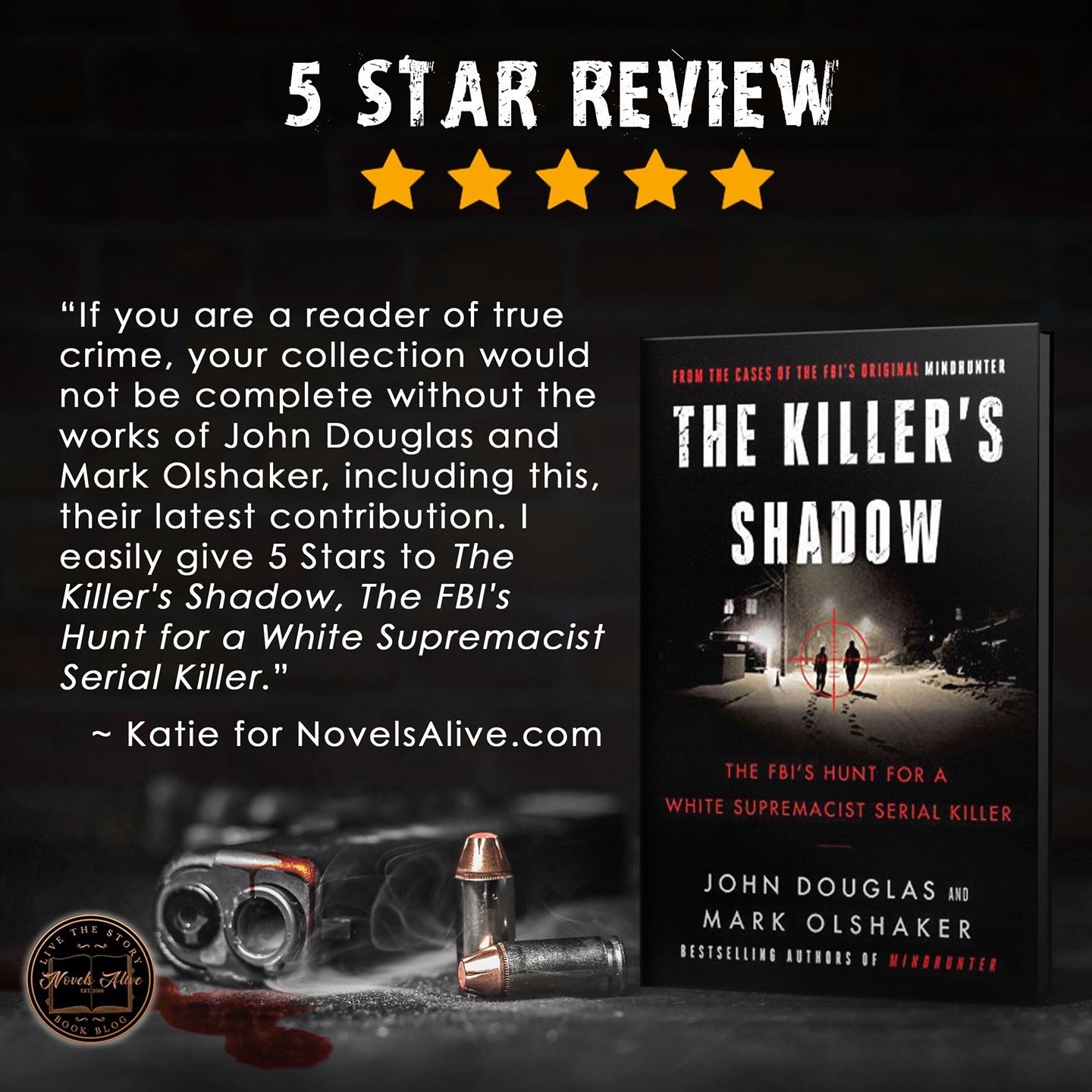
Thank you! We very much appreciate your interest. —Mark Olshaker
 Cases of the FBI’s Original Mindhunter: Book 1
Cases of the FBI’s Original Mindhunter: Book 1
Release Date: November 17, 2020
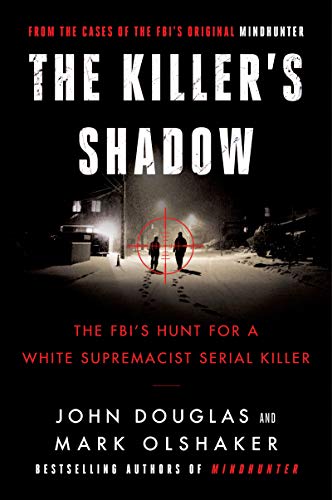 The legendary FBI criminal profiler and international bestselling author of Mindhunter and The Killer Across the Table returns with this timely, relevant book that goes to the heart of extremism and domestic terrorism, examining in-depth his chilling pursuit of, and eventual prison confrontation with Joseph Paul Franklin, a White Nationalist serial killer and one of the most disturbing psychopaths he has ever encountered.
The legendary FBI criminal profiler and international bestselling author of Mindhunter and The Killer Across the Table returns with this timely, relevant book that goes to the heart of extremism and domestic terrorism, examining in-depth his chilling pursuit of, and eventual prison confrontation with Joseph Paul Franklin, a White Nationalist serial killer and one of the most disturbing psychopaths he has ever encountered.
Worshippers stream out of an Midwestern synagogue after sabbath services, unaware that only a hundred yards away, an expert marksman and avowed racist, antisemite and member of the Ku Klux Klan, patiently awaits, his hunting rifle at the ready.
The October 8, 1977 shooting was a forerunner to the tragedies and divisiveness that plague us today. John Douglas, the FBI’s pioneering, first full-time criminal profiler, hunted the shooter—a white supremacist named Joseph Paul Franklin, whose Nazi-inspired beliefs propelled a three-year reign of terror across the United States, targeting African Americans, Jews, and interracial couples. In addition, Franklin bombed the home of Jewish leader Morris Amitay, shot and paralyzed Hustler magazine publisher Larry Flynt, and seriously wounded civil rights leader Vernon Jordan. The fugitive supported his murderous spree robbing banks in five states, from Georgia to Ohio.
Douglas and his writing partner Mark Olshaker return to this disturbing case that reached the highest levels of the Bureau, which was fearful Franklin would become a presidential assassin—and haunted him for years to come as the threat of copycat domestic terrorist killers increasingly became a reality. Detailing the dogged pursuit of Franklin that employed profiling, psychology and meticulous detective work, Douglas and Olshaker relate how the case was a make-or-break test for the still-experimental behavioral science unit and revealed a new type of, determined, mission-driven serial killer whose only motivation was hate.
A riveting, cautionary tale rooted in history that continues to echo today, The Killer’s Shadow is a terrifying and essential exploration of the criminal personality in the vile grip of extremism and what happens when rage-filled speech evolves into deadly action and hatred of the “other” is allowed full reign.
The Killer’s Shadow includes an 8-page color photo insert.


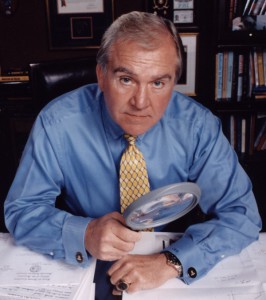 John Douglas, the legendary FBI criminal profiler and veteran author of true crime books, has spent over twenty-five years researching and culling the stories of America’s most disturbing criminals. A veteran of the United States Air Force, he has directly worked and/or had overall supervision in over 5,000 violent crime cases over the past 48 years. He is currently chairman of the board of the “Cold Case Foundation.” One of the foremost experts and investigators of criminal minds and motivations, he currently lives in the Washington, D.C. area.
John Douglas, the legendary FBI criminal profiler and veteran author of true crime books, has spent over twenty-five years researching and culling the stories of America’s most disturbing criminals. A veteran of the United States Air Force, he has directly worked and/or had overall supervision in over 5,000 violent crime cases over the past 48 years. He is currently chairman of the board of the “Cold Case Foundation.” One of the foremost experts and investigators of criminal minds and motivations, he currently lives in the Washington, D.C. area.
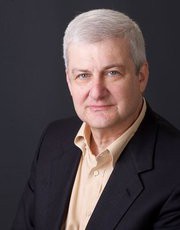 Mark Olshaker is an Emmy Award-winning documentary filmmaker and author of ten nonfiction books and five novels, including Einstein’s Brain and The Edge. His books with former FBI Special Agent and criminal profiling pioneer John Douglas, beginning with Mindhunter and, most recently, Law & Disorder, have sold millions of copies and have been translated into many languages. Mindhunter is now a dramatic series on Netflix, directed by David Fincher. He and his wife Carolyn, an attorney, live in Washington, D.C.
Mark Olshaker is an Emmy Award-winning documentary filmmaker and author of ten nonfiction books and five novels, including Einstein’s Brain and The Edge. His books with former FBI Special Agent and criminal profiling pioneer John Douglas, beginning with Mindhunter and, most recently, Law & Disorder, have sold millions of copies and have been translated into many languages. Mindhunter is now a dramatic series on Netflix, directed by David Fincher. He and his wife Carolyn, an attorney, live in Washington, D.C.
















